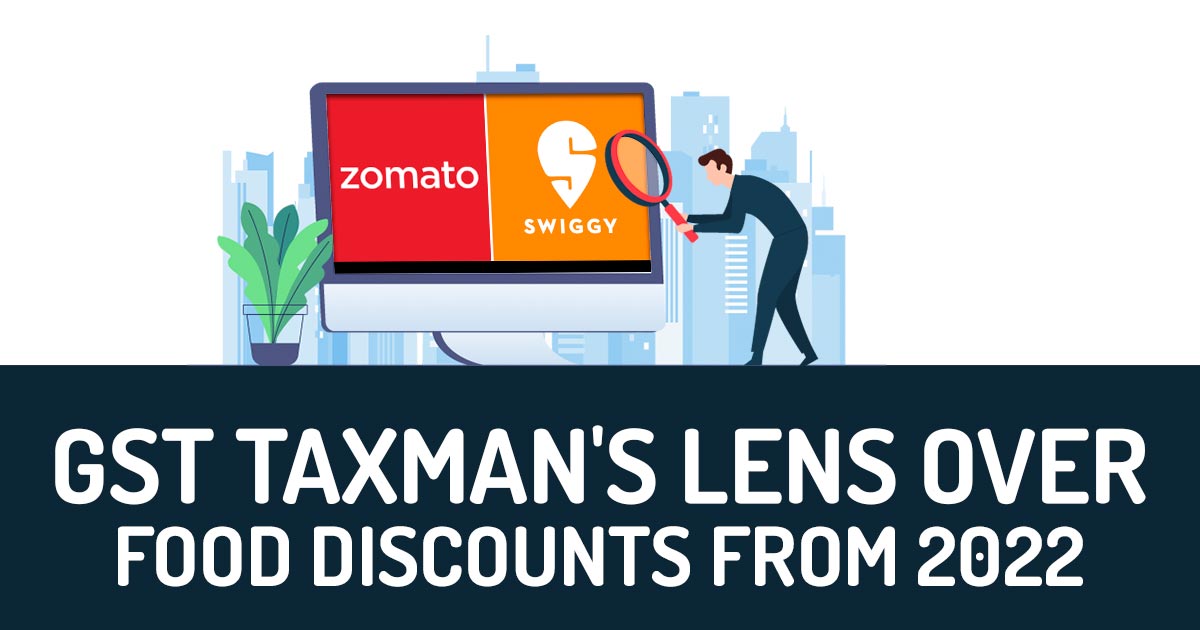
Under the GST regime, the coupon discounts furnished via food delivery platforms engaging with Zomato & Swiggy need to face the taxman’s investigation starting from Jan 2022.
The problem is about the discounts provided via delivery apps with respect to the specific credit card, debit card, or digital wallet towards doing the payments. People just conscious about the development noted that the arrangements amid restaurants and delivery apps that pose the outcome in discounts would indeed face the tax investigation.
From the 1st of January, the food delivery companies are treated identically with restaurants. The same shall mean that Swiggy and Zomato need to pay 5% GST on the sum of the cost for food.
But, not identical towards directly buying the food from the restaurant, the issues raised as the e-commerce operators (ECO) furnished to offer the discounts on different portions. To eliminate the cost of prices towards the consumers these firms provide discounts if the money gets furnished via credit or debit card.
For example, the cost of food is Rs 500 however the app deducts Rs 75 if the money is furnished via HDFC credit card. If the GST of 5% is subjected to apply on Rs 500 or on Rs 425.
The majority of cases denote that Swiggy and Zomato hold partnerships via banks. People mentioned that these arrangements would be acknowledged as a barter for the promotion of banking services or credit cards.
The tax counsel is examining that if the same comes beneath barter agreements between Swiggy and Zomato. Barter would also come under tax compliance as nothing is free under GST.
“Tax experts mentioned that while barter transactions are subject to levy under GST, all transactions may not fall within barter and have tax implications on both legs. For instance, the coupon discount recovered by an ECO will completely depend on the facts, nature of the transaction, and intention of the service to be provided, “
Zomato does not want to comment on the scenario. Swiggy does not answer to question of ET. The tax expert renders that the same discounts are indeed provided if the customer’s order is exceeding the specified limit or from the specific restaurant.
The tax council is designated to examine that if any money is being furnished via restaurants for these promotions, and if it does not then the same shall be scrutinized even if there is an engagement of barter.
The tax expert mentioned there is a difficulty close to the amount upon which the GST should be furnished despite in cases of the offered discounts.
GST does not get furnished by the small restaurants or Dhabas. When the customers were to order food via these locations then the delivery apps would be imposed with GST.
Read Also: Govt Authority Mandates Invoices Matched for GST ITC from 2022
“The liability to pay tax when the transaction is routed through an e-commerce operator is fastened to the ECO for the restaurant services and hence the question of double taxation does not arise. The hardship will be restricted to the unregistered service providers (Dhabas) as these transactions will have to bear the brunt of taxes, ” tax expert.
Issues are already there on the tips provided to the delivery boys increase the fees, delivery fees and packaging charges charged to customers would be seen under the GST framework.
“The concern pointed that this point (GST on surge fee, delivery cost, etc) was being discussed. The company is looking to charge 18% GST instead of 5% GST on this cost so that we can avail of the input tax credit. “
Restaurants are imposed 5% GST however they do not get ITC on the amount. “ET mentioned the food delivery platforms have huge costs in terms of technology and rent, and they would want an input tax credit. The thinking is that the tax department too would not take objection when they are paying 18% GST instead of 5%,”








